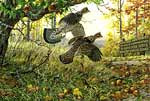If you’ve read any of the fishing entries below, you know I love to cast flies to stream-bred trout. You’ll find no mention of trolling. So please accept my apologies for the wording of this post’s title if you’ve arrived here in high dudgeon with blood in your eye.
I released the first trout I ever caught, in 1962. The site was the Cohocton River near Atlanta, and the fish was maybe 5” long. When I told my mentor, he was horrified: you threw back perfectly good breakfast food? The 13 year old who tossed that fish back was not clever enough to have invented “catch and release,” so the conflict between the historical “let’s catch a few fish to eat” and the new fangled “a wild trout is too precious to be caught just once” must already have been splashed all across the sportsmen’s magazines of the times.
I still catch a lot of 4” and 5” trout in my home water. I’m not a fisheries biologist, so I don’t know whether these small fish are all that’s left after “meat fishermen” have taken all the 9”ers, or if, on the other hand, these fish can’t get any bigger because they’ve got too many mouths for not enough food. I repeat: I don’t know.
But I think it’s a good question that deserves a well researched answer.
So I was interested to read a meditation on this subject in the back-page article of the Spring, 2018 TU magazine. The piece, which you can read here, is titled “Trout” It Was ‘What’s for Dinner!’,” written by Paul Bruun. Here’s how it opens:
“‘OMG, those guys are keeping a fish!’ chimed the lady in the passing driftboat. ‘What are we going to do about it?’ she wailed.
Despite current incendiary mores toward this once normal but now frowned-upon practice, ….”
Bruun reminisces from there in a warmly nostalgic way, thus guaranteeing his vilification in the Twitterverse and a dearth of Christmas cards from TU members.
For a deeper dive into wild trout management, take a look at “Lost in the Driftless” by Tim Traver. After not so many pages you — like me — will probably get fired up to buy a half dozen Cress Bugs and head for the streams of SW Wisconsin. But “Lost” is not a travelogue. Traver frames his themes around the career of Roger Kerr, a retired Wisconsin county fish manager who has strong opinions about trout fishing. Depending on whom Traver was interviewing at the moment, Kerr is either Gabriel or Lucifer. If you’re like me, you tend to view trout management in Wisconsin by TU apartment dwellers in Manhattan with a cocked eyebrow. But Traver does a good job of reporting instead of lobbying, and the book is a tasty if complicated intellectual chew.






No comments:
Post a Comment